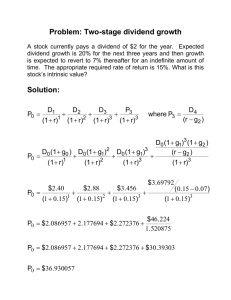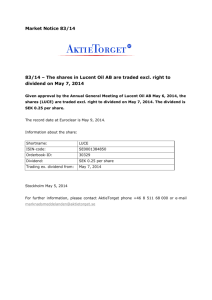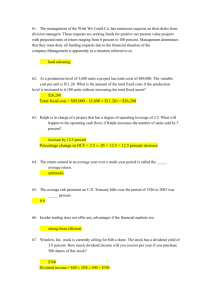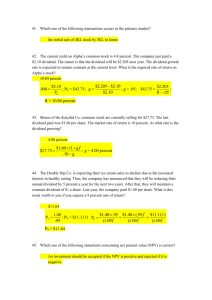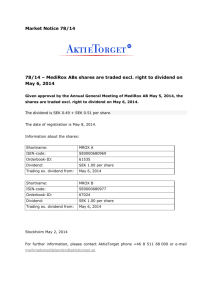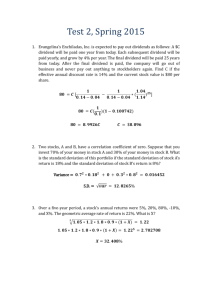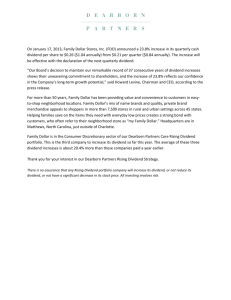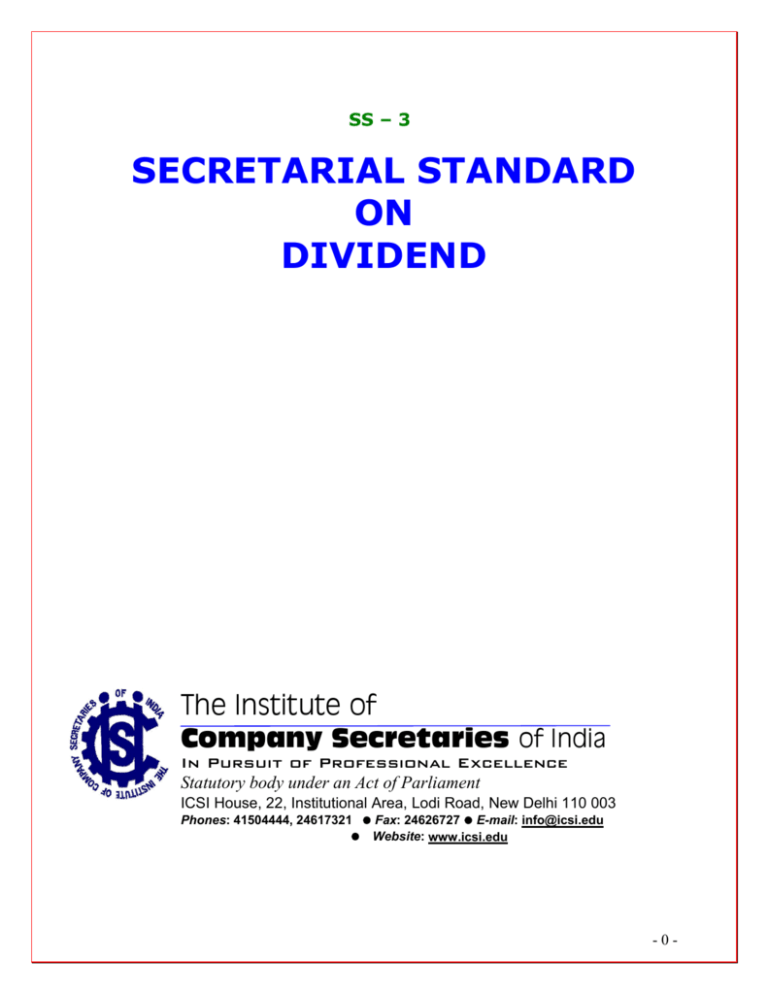
SS – 3
SECRETARIAL STANDARD
ON
DIVIDEND
The Institute of
Company Secretaries of India
In Pursuit of Professional Excellence
Statutory body under an Act of Parliament
ICSI House, 22, Institutional Area, Lodi Road, New Delhi 110 003
Phones: 41504444, 24617321
Fax: 24626727 E-mail: info@icsi.edu
Website: www.icsi.edu
-0-
MAY 2003
Published by :
THE INSTITUTE OF COMPANY SECRETARIES OF INDIA
‘ICSI House’, 22, Institutional Area, Lodi Road, New Delhi - 110 003
Phones : 51504444, 24617321-24, 24644431-32
o
Fax : 24626727
Email :
info@icsi.edu o Website : www.icsi.edu
© THE INSTITUTE OF COMPANY SECRETARIES OF INDIA
All rights reserved. No part of this publication may be translated or copied in any form or
by any means without the prior permission of The Institute of Company Secretaries of
India.
-1-
CONTENTS
Page
PREFACE TO THE SECRETARIAL STANDARDS
3
SECRETARIAL STANDARD ON DIVIDEND
INTRODUCTION
6
SCOPE
6
DEFINITIONS
7
SECRETARIAL STANDARDS
8
1. Ascertainment of amount available for
payment/distribution as Dividend
8
2. Declaration of Dividend
12
3. Entitlement to Dividend
13
4. Dividend in Abeyance
15
5. Payment of Dividend
15
6. Unpaid Dividend
17
7. Revocation of Dividend
18
8. Preservation of Dividend Warrants and
Dividend Registers
19
9. Disclosure
19
EFFECTIVE DATE
19
Annexure ‘A’
Companies (Transfer of Profits to Reserves) Rules, 1975
20
Annexure ‘B’
Companies (Declaration of Dividend out of Reserves)
Rules, 1975
22
-2-
PREFACE TO THE SECRETARIAL STANDARDS
Secretarial Standards Board and its Objectives
The Institute of Company Secretaries of India, (ICSI), recognising the need
for integration, harmonisation and standardisation of diverse secretarial
practices, has constituted the Secretarial Standards Board (SSB) with the
objective of formulating Secretarial Standards.
Scope and Functions of the Secretarial Standards Board
The scope of SSB is to identify the areas in which Secretarial Standards need
to be issued by the Council of ICSI and to formulate such Standards, taking
into consideration the applicable laws, business environment and best
secretarial practices. SSB will also clarify issues arising out of such
Standards and issue guidance notes for the benefit of members of ICSI,
corporates and other users.
The main functions of SSB are :
(i) Formulating Secretarial Standards;
(ii) Clarifying issues arising out of the Secretarial Standards;
(iii) Issuing Guidance Notes; and
(iv) Reviewing and updating the Secretarial Standards / Guidance Notes at
periodic intervals.
Need for Secretarial Standards
Companies follow diverse secretarial practices and, therefore, there is a
need to integrate, harmonise and standardise such practices so as to
promote uniformity and consistency.
Scope of Secretarial Standards
The Secretarial Standards do not seek to substitute or supplant any existing
laws or the rules and regulations framed thereunder but, in fact, seek to
supplement such laws, rules and regulations.
Secretarial Standards that are issued will be in conformity with the
provisions of the applicable laws. However, if, due to subsequent changes in
the law, a particular Standard or any part thereof becomes inconsistent with
such law, the provisions of the said law shall prevail.
ICSI will endeavour to persuade the Government and appropriate authorities
to enforce these Standards, to facilitate the adoption thereof by industry and
corporate entities in order to achieve the desired objective of standardisation
of secretarial practices.
-3-
Procedure for issuing Secretarial Standards
The following procedure shall be adopted for formulating and issuing
Secretarial Standards:
1. SSB, in consultation with the Council, shall determine the areas in
which Secretarial Standards need to be formulated and the priority in
regard to the selection thereof.
2. In the preparation of Secretarial Standards, SSB may constitute
Working Groups to formulate preliminary drafts of the proposed
Standards.
3. The preliminary draft of the Secretarial Standard prepared by the
Working Group shall be circulated amongst the members of SSB for
discussion and shall be modified appropriately, if so required.
4. The preliminary draft will then be circulated to the members of the
Central Council as well as to Chairmen of Regional Councils/ Chapters
of ICSI, various professional bodies, Chambers of Commerce,
regulatory authorities such as the Department of Company Affairs, the
Department of Economic Affairs, the Securities and Exchange Board of
India, Reserve Bank of India, Department of Public Enterprises and to
such other bodies/organisations as may be decided by SSB, for
ascertaining their views, specifying a time-frame within which such
views, comments and suggestions are to be received.
A meeting of SSB with the representatives of such bodies /
organisations may then be held, if considered necessary, to examine
and deliberate on their suggestions.
5. On the basis of the preliminary draft and the discussion with the
bodies / organisations referred to in 4 above, an Exposure Draft will be
prepared and published in the “Chartered Secretary”, the journal of
ICSI, and also put on the Website of ICSI to elicit comments from
members and the public at large.
6. The draft of the proposed Secretarial Standard will generally include
the following basic points:
(a)
Concepts and fundamental principles relating to the subject of
the Standard;
(b)
Definitions and explanations of terms used in the Standard;
(c)
Objectives of issuing the Standard;
(d)
Disclosure requirements; and
(e)
Date from which the Standard will be effective.
-4-
7. After taking into consideration the comments received, the draft of the
proposed Secretarial Standard will be finalised by SSB and submitted
to the Council of ICSI.
8. The Council will consider the final draft of the proposed Secretarial
Standard and finalise the same in consultation with SSB. The
Secretarial Standard on the relevant subject will then be issued under
the authority of the Council.
Compliance with Secretarial Standards
In the initial years, the Secretarial Standards will be recommendatory. The
Institute will request the Government and other appropriate authorities to
enforce these Standards and will endeavour to educate the users about the
utility and need for compliance with these Standards. The Standards would
be made mandatory thereafter.
-5-
SECRETARIAL STANDARD
ON
DIVIDEND
The following is the text of the Secretarial Standard-3 (SS-3), issued by the
Council of the Institute of Company Secretaries of India on “Dividend”.
In the initial period, adherence by a company to this Secretarial Standard
will be recommendatory.
In this Secretarial Standard, the Standard portions have been set in bold
type. These should be read in the context of the background material, which
has been set in normal type, and in the context of the ‘Preface to the
Secretarial Standards’.
INTRODUCTION
This Standard seeks to prescribe a set of principles in relation to the
declaration and payment of Dividend and matters incidental thereto or
connected therewith.
Dividend is a return on the investment made in the share capital of a
company, as distinct from the return on borrowed capital, which is in the
form of interest. For the purposes of this Standard, capitalization of profits in
the form of bonus shares is not Dividend.
In commercial usage, the term “Dividend” refers to the share of the profits
of a company that is distributed amongst the Members of the company.
The term “Dividend” has been inclusively defined in the Companies Act,
1956, (“the Act”) to the effect that it includes Interim Dividend. The Act
neither specifically defines the term Dividend nor makes any distinction
between interim and final Dividend.
SCOPE
The principles enunciated in this Standard for Dividend relate to Dividend
under the Act and are governed by the provisions of Sections 205, 205A,
205B, 205C, 206, 206A, 207 of the Act and also by the Companies (Transfer
of Profits to Reserves) Rules, 1975, the Companies (Declaration of Dividend
out of Reserves) Rules, 1975 and the Investor Education and Protection
Fund (Awareness and Protection of Investors) Rules, 2001. The provisions of
Section 27 of the Securities Contracts (Regulation) Act, 1956 are also
applicable as are, in the case of listed companies, the requirements of the
Listing Agreement. Any specific provision relating to Dividend in the Income
Tax Act, 1961, and any other statute would, in addition, be applicable as set
out in that statute/legislation.
-6-
The principles set out herein relate to both equity as well as preference
share capital in accordance with the provisions of Sections 85 and 86 of the
Act. While the principles generally relate to final Dividend, certain principles
also apply to Interim Dividend declared by the Board of Directors, as stated
hereinafter. Further, the principles set out herein are in respect of Dividend
as it relates to a going concern. This Standard does not deal with Dividend of
companies under liquidation, for which reference has been made in the
Guidance Note on the subject.
DEFINITIONS
The following terms are used in this Standard with the meaning specified:
“Act” means the Companies Act, 1956 (1 of 1956), or any statutory
modification or re-enactment thereof and includes any Rules and Regulations
framed thereunder.
“Articles” means the Articles of Association of a company, as originally
framed or as altered from time to time, including, where they apply, the
Regulations contained in the Tables in Schedule I to the Act.
“Board” or “Board of Directors” means the Board of Directors of a company.
“Dividend” means a distribution of any sums to Members out of profits or
reserves available for the purpose and, in the context of this Standard,
refers to Dividend recommended by the Board and declared by Members, i.e.
‘final’ Dividend.
“Free Reserves” means reserves the utilisation of which is not restricted in
any manner.
“Interim Dividend” means the Dividend declared in a Meeting of the Board of
Directors.
“Member” means any person who agrees, either by subscribing to the
Memorandum of Association of the company or by applying in writing, to
become a Member of the company and whose name is entered either in the
Register of Members of the company or in the records of the depository as a
beneficial owner in respect of the shares of the company held by him.
“Preference Shareholder” means a holder of such shares as carry a
preferential right, in respect of Dividend, to a fixed amount or an amount at
a fixed rate and, in respect of capital, to repayment of capital.
“Shareholder” means a Member as defined above and, where the context
requires or admits, includes Preference Shareholder.
Words and expressions used but not defined herein shall have the meaning
respectively assigned to them under the Act.
-7-
References herein to Sections and Regulations relate, respectively, to
Sections of the Act and Regulations of Table A of the Act, unless otherwise
stated.
SECRETARIAL STANDARDS
1. Ascertainment of amount available for payment/distribution as
Dividend.
1.1
Out of profits
1.1.1
Dividend should be paid out of the profit of the
company for the financial year or out of profit(s)
for the previous financial year(s) which have not
been transferred to reserves, or out of both, only
after providing for depreciation for the year and
arrears of depreciation, if any.
Dividend, being a portion of the profits of the company,
is distributable amongst the Members of the company in
accordance with the provisions of the Act. The Act
requires a company to prepare a profit and loss account
which should give a true and fair view of the profit or
loss of the company for a financial year. The Act does
not define the word ‘profit’ or the expression ‘true and
fair’. These words and expressions should therefore be
understood in their natural and proper sense. This
would imply that the profit and loss account should be
prepared and presented in conformity with the
requirements set out in the Act and the generally
accepted principles of accounting, which should be
consistently applied.
In order to arrive at a true and fair view and to
ascertain such profit, depreciation should be calculated
in accordance with the provisions of the Act. While the
Act specifies the minimum rates of depreciation,
companies may provide higher depreciation based on a
technological evaluation of the life of the asset on which
depreciation is to be provided.
Dividend may, however, be paid without providing for
depreciation for the current year or previous year(s)
with the prior permission of the Central Government.
1.1.2
Before declaring Dividend out of profit for the
year, any loss for the previous year(s) or the
amount of depreciation for the previous year(s),
-8-
whichever is less, should be set off against such
profit.
The Act provides that in case a company has incurred
loss in any previous financial year or years, the amount
of loss or an amount which is equal to the amount
provided for depreciation for that previous financial year
or those previous financial years, whichever is less,
shall be set off against the profit of the company for the
year for which Dividend is proposed to be declared or
paid. In either case, such profit is to be arrived at after
providing for depreciation in accordance with the
provisions contained in the Act.
1.1.3
Dividend should not be declared out of the
Securities Premium Account or the Capital
Redemption Reserve Account or Revaluation
Reserve or Amalgamation Reserve or out of profit
on re-issue of forfeited shares or out of profit
earned prior to the incorporation of the company.
Dividend should be declared only out of profits, Free
Reserves or out of moneys provided by the Central
Government or State Government for this purpose in
pursuance of a guarantee given by such Government.
The Act does not permit payment of Dividend out of the
Securities Premium Account. Revaluation Reserve and
Amalgamation Reserve are not profits of the business
nor are they created out of such profits, and hence
cannot be applied in the payment of Dividend. Profit
prior to incorporation is in the nature of capital reserve
and hence is not available for distribution.
1.1.4
No Dividend should be declared unless the
prescribed percentage of profit is transferred to
reserves in accordance with the Companies
(Transfer of Profits to Reserves) Rules, 1975.
In case Dividend is paid out of the opening balance in
the profit and loss account, the company should make
the prescribed transfer to reserves as if the Companies
(Transfer of Profits to Reserves) Rules, 1975 are
applicable. However, the company would not, in such a
case, be required to comply with the Companies
(Declaration of Dividend out of Reserves) Rules, 1975.
-9-
The Companies (Transfer of Profits to Reserves) Rules,
1975 only apply to equity Dividend and to that portion
of Dividend relating to participating preference shares
which is in excess of the fixed rate of preference
Dividend.
The Companies (Transfer of Profits to Reserves) Rules,
1975 are given at Annexure ‘A’.
1.1.5
Interim Dividend, if declared, is payable out of
estimated profit for the period for which Interim
Dividend is to be declared, after taking into
account depreciation for the full year and arrears
of depreciation, Dividend at the contracted rate on
preference shares, if any, appropriations and
transfers to statutory reserves, taxation, and the
provisions of the Companies (Transfer of Profits
to Reserves) Rules, 1975.
Interim Dividend may be declared after the Board has
considered the interim financial statements for the
period for which Interim Dividend is to be declared and
is satisfied that the financial position of the company
justifies and can support such declaration. The interim
financial statements so prepared should take into
account depreciation for the full year, taxation including
deferred tax and other anticipated losses for the year.
The interim financial statements should also take into
account the Dividend that would have to be paid at the
contracted rate on preference shares.
The Board should also take into account the specified
percentage required to be transferred to reserves
before declaration of Interim Dividend. Such transfer
should be effected while preparing final accounts for the
year.
1.1.6
Where a company has issued equity shares with
differential rights as to Dividend, Interim Dividend
may, at the option of the Board, be declared on all
or any one or more of the classes of such shares
in accordance with the terms of issue.
In case Interim Dividend is declared on only one class
of equity shares, the Directors should ensure that the
profit as shown in the interim financial statements is
- 10 -
adequate to meet the Dividend that would have to be
paid on the other classes of equity shares apart from
the depreciation for the full year and arrears of
depreciation, taxation including deferred tax, transfer to
reserves, Dividend on preference shares issued, if any,
and other anticipated losses for the year.
Where a company has issued equity shares with
differential rights as to voting, no differentiation should
be made in the declaration of Interim Dividend on
equity shares.
Standards 1.1.1, 1.1.2 and 1.1.3 shall also apply to Interim
Dividend.
1.2 Out of Reserves
1.2.1
In a year in which the profits are inadequate or
there are no profits, the company may declare and
pay Dividend out of Free Reserves after making
provision for depreciation and subject to the
provisions of the Companies (Declaration of
Dividend out of Reserves) Rules, 1975.
The Companies (Declaration of Dividend out of
Reserves) Rules, 1975, specify the maximum amount
which can be paid out of Free Reserves as Dividend on
equity shares. The Act provides that if a company
intends to declare a Dividend which is not in accordance
with the aforesaid Rules, the company should seek prior
approval of the Central Government.
The maximum rate of Dividend that may be declared
from reserves in terms of the Companies (Declaration of
Dividend out of Reserves) Rules, 1975, is ten per cent
of paid-up capital while the Companies (Transfer of
Profits to Reserves) Rules, 1975 become applicable only
in respect of declaration of Dividend at a rate exceeding
ten per cent. Hence, any company, which draws from
its reserves to pay Dividend, will not be required to
make any appropriation to reserves in terms of the
Companies (Transfer of Profits to Reserves) Rules, 1975
since the Dividend declared by it from reserves cannot
exceed ten per cent.
- 11 -
The Companies (Declaration of Dividend out
Reserves) Rules, 1975 are given at Annexure ‘B’.
1.2.2
of
Interim Dividend should not be declared out of
reserves.
While final Dividend may be paid out of Free Reserves,
no Interim Dividend should be paid, in the event of a
loss or inadequacy of profits, by transfers out of any
reserves.
2. Declaration of Dividend
2.1
Dividend should be declared only on the recommendation
of the Board, made at a meeting of the Board.
The recommendation for declaration of Dividend should not be
made by a Committee of the Board nor by way of a Resolution
passed by circulation.
Unless the Dividend has been recommended by the Board,
Members in General Meeting cannot on their own declare any
Dividend.
Where a company has an Audit Committee, this Committee
should consider the financial statements before submission to
the Board. Dividend should be recommended by the Board after
consideration and approval of the financial statements. All
requisite approvals should be obtained before declaration of
Dividend. Dividend should not be declared subject to any
condition such as the approval of financial institutions/banks or
foreign collaborators or compliance with any other contractual
obligation.
2.2
Dividend should be declared only at an Annual General
Meeting.
Dividend should relate to a financial year and should be declared
by the Members at the Annual General Meeting of the company
after consideration of the balance sheet and profit and loss
account. Members may declare a lower rate of Dividend than
what is recommended by the Board but have no power to
increase the amount or rate of Dividend recommended by the
Board.
2.3
No Dividend should be declared on equity shares for
previous years in respect of which annual accounts have
- 12 -
already been adopted at the respective Annual General
Meetings.
Arrears of preference Dividend on cumulative preference shares
for previous years may, however, be declared and paid.
2.4
Interim Dividend should be declared by the Board, at a
meeting of the Board.
Declaration of Interim Dividend should not be made by a
Committee of the Board nor by way of a Resolution passed by
Circulation.
While final Dividend is recommended by the Board and declared
by Members, approval of Members is not required for declaration
of Interim Dividend. Where a company has an Audit Committee,
this Committee should consider the interim financial statements
which should then be submitted to the Board for consideration
and declaration of Interim Dividend.
2.5
If redeemable preference shares have not been redeemed
on the due date, no Dividend should be declared on equity
shares until such preference shares are redeemed.
While the Act now does not permit the issue of irredeemable
preference shares, where a company had issued redeemable
preference shares but has failed to redeem them on the due
date, no Dividend should be declared on equity shares until such
failure has been remedied.
Standard 2.5 shall also apply to Interim Dividend.
3. Entitlement to Dividend
3.1
Only the registered holders of shares are entitled to
Dividend.
Dividend should be paid (i) in respect of shares held in electronic
form, to those persons whose names appear as beneficial owners
in the statement(s) furnished by the Depository(ies) as on the
close of the market day prior to book closure or, in the case of
Interim Dividend, on the record date; (ii) in respect of shares
held in physical form, to those Shareholders whose names
appear on the company’s register of members after giving effect
to all valid share transfers in physical form lodged with the
company before the date of book closure or, in the case of
Interim Dividend, on the record date; and (iii) in respect of share
warrants, to the holders of such warrants.
- 13 -
3.2
Preference Shareholders should be paid Dividend before
Dividend is paid to the equity Shareholders of the
company.
Preference shares carry a preferential right as to Dividend in
accordance with the terms of issue and the Articles. However,
this right is subject to the availability of distributable profits.
If there are two or more classes of preference shares, the holders of the
class which has priority are entitled to their preference Dividend before
any Dividend is paid in respect of the other class, if the terms of issue so
provide. If the terms of issue are silent, Dividend should be distributed on
pro-rata basis.
In the case of Interim Dividend, while Preference Shareholders
need not necessarily be paid Dividend before Interim Dividend is
paid to equity shareholders, the Board should set aside such sum
as would be necessary to pay Dividend to Preference
Shareholders at the contracted rate.
3.3
Arrears of Dividend on cumulative preference shares
should be paid before payment of any Dividend on equity
shares.
Preference shares may be cumulative or non-cumulative.
Dividend in arrears on cumulative preference shares can be paid
in a later year where there are profits to justify such payment.
In the case of non-cumulative preference shares, if no Dividend
can be paid in a year, there is no right to receive it in future
years.
After paying the preference Dividend and any arrears of Dividend
on cumulative preference shares, residual profit may be utilized
for payment of Dividend to equity Shareholders. However, where
participating preference shares have been issued, the holders
thereof also have the right to participate in such residual profit.
3.4
Dividend on equity shares should be paid in accordance
with the rights of the respective classes, if any, of such
shares.
Where a company issues equity shares with differential rights as
to Dividend, the terms of issue of such shares will govern the
rights of each such class of holders as to receipt of Dividend.
Standards 3.1, 3.3 and 3.4 shall also apply to Interim Dividend.
- 14 -
4. Dividend in Abeyance
4.1
The amount of Dividend in respect of shares for which
an instrument of transfer has been tendered to the
company but which have not been registered for any
valid reason should be transferred to Unpaid Dividend
Account.
If a Member authorizes the company in writing to pay the
Dividend to the transferee specified in the instrument of
transfer, the company should act upon such authorization.
However, in the case of shares which have not been
transferred because the ownership thereof is in dispute, or
where attachment/prohibitory orders have been passed by a
court or statutory authority, Dividend should be held in
abeyance by transferring to the Unpaid Dividend Account.
Standard 4.1 shall also apply Interim Dividend.
5. Payment of Dividend
5.1
Dividend should
declaration.
be
paid
within
thirty
days
of
The amount of Dividend after deducting tax at source, if
applicable, should be deposited in a separate bank account
within five days from the date of declaration of Dividend.
Dividend should be paid out of such bank account within
thirty days of declaration.
5.2
Dividend should be paid in cash, not in kind.
Dividend payable in cash may be paid by cheque or warrant
or demand draft or pay order or may be credited to the bank
account of the Member in terms of a mandate given by the
Member.
The cheque or warrant or demand draft or pay order should
be sent to the registered address of the Member and, in the
case of joint holders, to the registered address of the person
named first in the register of members or to such person or to
such address as the Member or the joint holders have
directed, in writing.
5.3
Initial validity of the Dividend warrant should be for
three months.
A cheque or warrant for payment of Dividend should be valid
for three months from the date thereof and, where such
- 15 -
cheque or warrant remains unpaid after this initial period of
validity, it should be revalidated for not more than three
months or a fresh instrument should be issued which should
have a validity of three months.
The company should revalidate the Dividend warrant or issue
a fresh Dividend warrant or a demand draft or pay order in
lieu thereof, within fifteen days of the receipt of a request for
revalidation.
Particulars of every revalidated Dividend warrant should be
entered in a Register of Revalidated Dividend Warrants
indicating the name of the person to whom the Dividend
warrant is issued, the number and amount of the Dividend
warrant and the date of revalidation.
5.4
A duplicate Dividend warrant should be issued only
after the expiry of the validity of the Dividend warrant
and the reconciliation of the paid amounts thereof. In
case the original instrument is not tendered to the
company, a duplicate warrant should be issued only
after obtaining requisite indemnity/ declaration from
the Shareholder.
In the case of defaced, torn or decrepit Dividend warrants, a
duplicate warrant may be issued before the expiry of the
validity period of the Dividend warrant on surrender to the
company of such defaced, torn or decrepit warrant.
Particulars of every Dividend warrant issued as aforesaid
should be entered in a Register of Duplicate Dividend
Warrants, indicating the name of the person to whom the
Dividend warrant is issued, the number and amount of the
Dividend warrant in lieu of which the duplicate warrant is
issued and the date of issue of such duplicate warrant.
5.5
The Dividend warrant must be accompanied by a
statement in writing showing the amount of Dividend
paid and the amount of tax deducted at source, if any.
Where a tax on distribution of Dividend is not levied on the
company but income tax is required to be deducted at source
from Dividend payable to Members, a tax deduction
certificate, in the prescribed form, should be issued to the
Members to whom Dividend has been paid after deduction of
income tax at source at the applicable rates.
- 16 -
Even where payment of Dividend is made by electronic mode
directly to the credit of the bank account of the Member, the
company should send to the Member a statement in writing
showing the amount of Dividend paid and the amount of tax
deducted at source, if any.
5.6
Dividend should be paid proportionately on the paid-up
value of shares.
Unless the Articles provide otherwise, Dividend should be paid
in proportion to the amount paid-up on the shares and for the
portion of the period of the financial year in respect of which
it is paid. If any shares are issued on terms providing that
they shall rank for Dividend as from a particular date,
Dividend on such shares should be paid accordingly.
5.7
Calls in arrears and any other sum due from a Member
may be adjusted against Dividend payable to the
Member.
In the case of listed companies, calls in arrears or any other
sum due from a Member in the capacity of a Member may be
adjusted against the Dividend payable to him after giving
such notice, as may be required. In the case of other
companies, unless the Articles provide otherwise, any other
sums due from a Member, in a capacity other than as a
Member, may also be adjusted against the Dividend payable
to him.
Standards 5.1 to 5.7 shall also apply to Interim Dividend.
6. Unpaid Dividend
6.1
The amount of Dividend which remains unpaid or
unclaimed after thirty days from the date of declaration
should be transferred to a special Dividend account, to
be called ‘Unpaid Dividend Account’ of the company,
within seven days from the date of expiry of the thirty
days period provided for payment of Dividend.
The company should maintain the details of unpaid or
unclaimed Dividend and reconcile the amounts thereof with
the concerned bankers, periodically.
6.2
Any amount in the Unpaid Dividend Account of the
company which remains unclaimed and unpaid for a
period of seven years from the date of transfer of such
- 17 -
amount to the Unpaid Dividend Account should be
transferred to the Investor Education and Protection
Fund.
Any transfer to the Investor Education and Protection Fund
should be made within thirty days of the expiry of seven
years from the date of transfer to the Unpaid/Unclaimed
Dividend Account.
6.3
Before transferring any amount to the Investor
Education and Protection Fund, the company should
give individual intimation to the Members in respect of
whose unclaimed Dividend the amount is being
transferred, at least six months before the due date of
such transfer.
After the expiry of the period of seven years from the date
from which unclaimed and unpaid Dividends were transferred
to the Unpaid Dividend Account, no claims shall lie against the
Fund or the company in respect of any such amounts. Hence,
the company should intimate the concerned Members
individually of the amount of Dividend remaining unclaimed
which is liable to be transferred to the Investor Education and
Protection Fund and advising the Member to claim such
amount of Dividend from the company before such transfer.
6.4
Any interest earned on the Unpaid Dividend Account
should be transferred to the Investor Education and
Protection Fund.
If the Unpaid Dividend Account is kept as a fixed deposit or in
any account on which interest is earned, the interest earned
should be transferred to the Investor Education and
Protection Fund.
Standards 6.1 to 6.4 shall also apply to Interim Dividend.
7. Revocation of Dividend
7.1
Dividend, once declared, becomes a debt and should
not be revoked.
Standard 7.1 shall also apply to Interim Dividend.
- 18 -
8. Preservation of Dividend Warrants and Dividend Registers
8.1
Dividend warrants returned by the Bank, after payment
thereof, and the Dividend Registers should be
preserved for a period of eight years.
Where the company has given an undertaking to the Bank for
preservation or safe keeping of paid Dividend warrants for a
specified period, the warrants should be preserved for such
period or eight years from the date of the warrant, whichever
is longer.
Standard 8. 1 shall also apply to Interim Dividend.
9. Disclosure
9.1
The Balance Sheet of the company should disclose
under the head ‘current liabilities and provisions’, the
amount lying in the Unpaid Dividend Account together
with interest accrued thereon, if any.
9.2
The Annual Report of the company should disclose the
total amount lying in the Unpaid Dividend Account of
the company in respect of the last seven years. The
amount of Dividend, if any, transferred by the company
to the Investor Education and Protection Fund during
the year should also be disclosed.
The amounts lying in the Unpaid Dividend Account and the
amounts transferred to the Investor Education and Protection
Fund should be disclosed in the Directors’ Report.
9.3
The Annual Return of the company should mention that
the amount of Dividend remaining unpaid or unclaimed
for a period of seven years from the date such Dividend
became payable by the company, together with interest
accrued thereon, if any, has been credited to the
Investor Education and Protection Fund.
Standards 9.1 to 9.3 shall also apply to Interim Dividend.
EFFECTIVE DATE
This Standard shall come into effect from 22nd May 2003.
- 19 -
Annexure ‘A’
Companies (Transfer of Profits to Reserves) Rules, I975
[GSR 426(E), DATED 24-7-1975]
In exercise of the powers conferred by Sub-section (2A) of Section 205, read
with clause (a) of Sub-section (1) of Section 642, of the Companies Act,
1956 (1 of 1956), the Central Government hereby makes the following rules,
namely :—
Short title
1. These rules may be called the Companies (Transfer of Profits to Reserves)
Rules, 1975
Percentage of profits to be transferred to reserves
2. No dividend shall be declared or paid by a company for any financial year
out of the profits of the company for that year arrived at after providing
for depreciation in accordance with the provisions of Sub-section (2) of
Section 205 of the Act, except after the transfer to the reserves of the
company of a percentage of its profits for that year as specified below :
(i) where the dividend proposed exceeds 10 per cent but not 12.5 per
cent of the paid-up capital, the amount to be transferred to the
reserves shall not be less than 2.5 per cent of the current profits;
(ii) where the dividend proposed exceeds 12.5 per cent but does not
exceed 15 per cent of the paid-up capital, the amount to be
transferred to the reserves shall not to be less than 5 per cent of
the current profits;
(iii)where the dividend proposed exceeds 15 per cent but does not
exceed 20 per cent of the paid-up capital the amount to be
transferred to the reserves shall not be less than 7.5 per cent of the
current profits; and
(iv)where the dividend proposed exceeds 20 per cent of the paid-up
capital, the amount to be transferred to reserves shall not be less
than 10 per cent of the current profits.
Conditions governing voluntary transfer of a higher percentage
3. Nothing in rule 2 shall be deemed to prohibit the voluntary transfer by a
company of a percentage higher than 10 per cent of its profits to its
reserves for any financial year, so however, that :
(i) Where a dividend is declared,—
- 20 -
(a)
a minimum distribution sufficient for the maintenance of
dividends to shareholders at a rate equal to the average of the
rates at which dividends declared by it over the three years
immediately preceding the financial year, or
(b)
in a case where bonus shares have been issued in the financial
year in which the dividend is declared or in the three years
immediately preceding the financial year, a minimum distribution
sufficient for the maintenance of dividends to shareholders at an
amount equal to the average amount (quantum) of dividend
declared over the three years immediately preceding the
financial year
is ensured:
Provided that in a case where the net profits after tax are lower by 20
per cent or more than the average net profits after tax of the two
financial years immediately preceding, it shall not be necessary to
ensure such minimum distribution,
(ii) where no dividend is declared, the amount proposed to be transferred
to its reserves from the current profits shall be lower than the average
amount of the dividends to the shareholders declared by it over the
three years immediately preceding the financial year.
Penalty
4. If company fails to comply with any of the provisions contained in these
rules, the company and every officer of the company in default, shall be
punishable with fine which may extend to five hundred rupees, and,
where the contravention is a continuing one, with further fine which may
extend to fifty rupees for every day, after the first, during which such
contravention continues.
- 21 -
Annexure ‘B’
Companies (Declaration of Dividend out of Reserves) Rules, 1975
[GSR 427(E), DATED 24-7-1975]
In exercise of the powers conferred by Sub-section (3) of Section 205A, read
with clause (a) of Sub-section (1) of Section 642, of the Companies Act,
1956 (1 of 1956), the Central Government hereby makes the following rules,
namely :—
Short title
1. These rules may be called the Companies (Declaration of Dividend out of
Reserves) Rules, 1975.
Declaration of dividend out of reserves
2. In the event of inadequacy or absence of profits in any year, dividend
may be declared by a company for that year out of the accumulated
profits earned by it in previous years and transferred by it to the
reserves, subject to the conditions that—
(i) the rate of the dividend declared shall not exceed the average of the
rates at which dividend was declared by it in the five years
immediately preceding that year or ten per cent of its paid-up capital,
whichever is less;
(ii) the total amount to be drawn from the accumulated profits earned in
previous years and transferred to the reserves shall not exceed an
amount equal to one-tenth of the sum of its paid-up capital and free
reserves and the amount so drawn shall first be utilized to set off the
losses incurred in the financial year before any Dividend in respect of
preference or equity shares is declared; and
(iii) the balance of reserves after such drawal shall not fall below fifteen
per cent of its paid-up share capital.
Explanation : For the purposes of this rule, “profits earned by a company in
previous years and transferred by it to the reserves” shall mean the total
amount of net profits after tax, transferred to reserves as at the beginning of
the year for which the dividend is to be declared; and in computing the said
amount, the appropriations out of the amount transferred from the
Development Rebate Reserve [at the expiry of the period specified under the
Income-tax Act, 1961 (43 of 1961)] shall be included and all items of Capital
Reserves including reserves created by revaluation of assets shall be
excluded.
- 22 -

